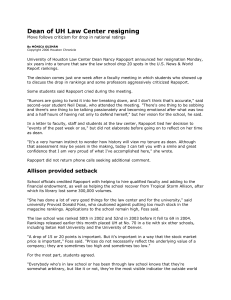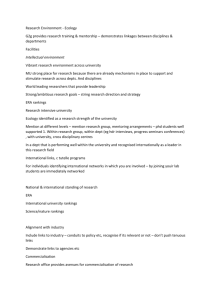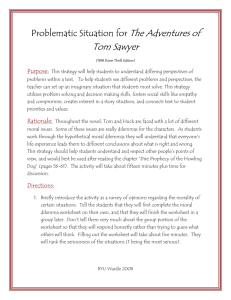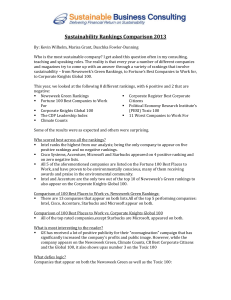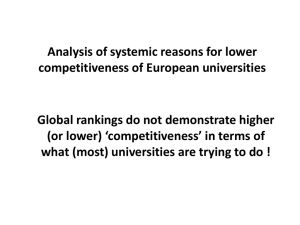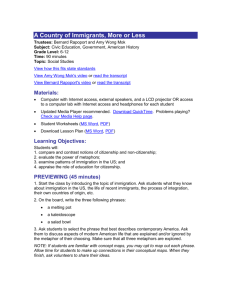Texas Lawyer - nancy-b-rapoport.com
advertisement
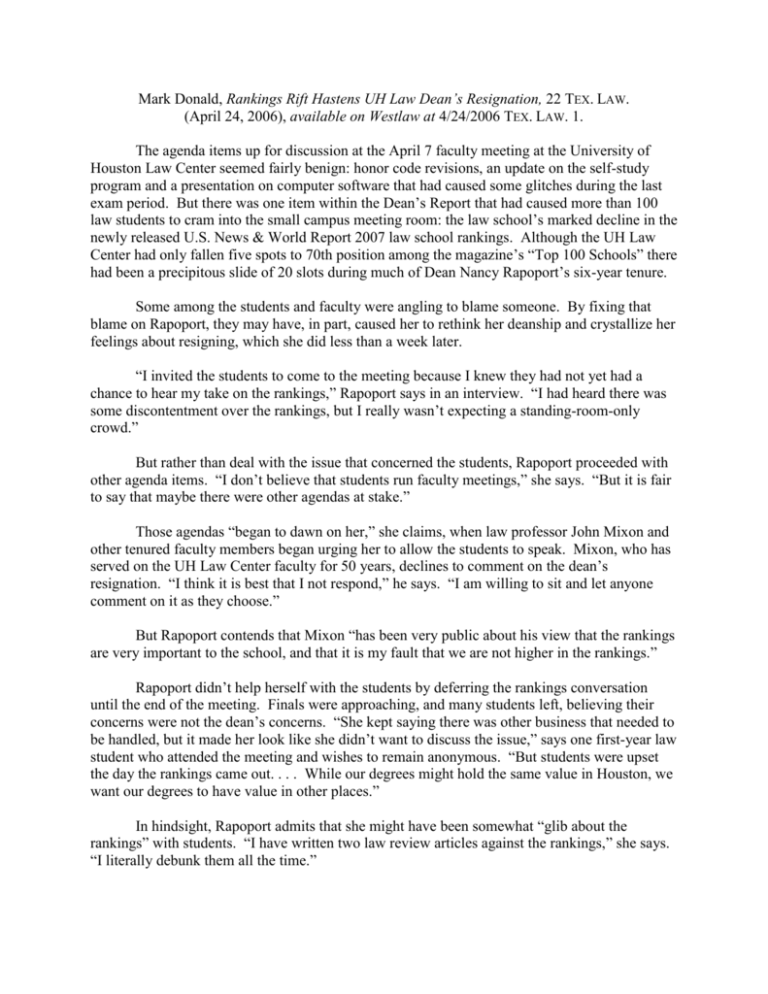
Mark Donald, Rankings Rift Hastens UH Law Dean’s Resignation, 22 TEX. LAW. (April 24, 2006), available on Westlaw at 4/24/2006 TEX. LAW. 1. The agenda items up for discussion at the April 7 faculty meeting at the University of Houston Law Center seemed fairly benign: honor code revisions, an update on the self-study program and a presentation on computer software that had caused some glitches during the last exam period. But there was one item within the Dean’s Report that had caused more than 100 law students to cram into the small campus meeting room: the law school’s marked decline in the newly released U.S. News & World Report 2007 law school rankings. Although the UH Law Center had only fallen five spots to 70th position among the magazine’s “Top 100 Schools” there had been a precipitous slide of 20 slots during much of Dean Nancy Rapoport’s six-year tenure. Some among the students and faculty were angling to blame someone. By fixing that blame on Rapoport, they may have, in part, caused her to rethink her deanship and crystallize her feelings about resigning, which she did less than a week later. “I invited the students to come to the meeting because I knew they had not yet had a chance to hear my take on the rankings,” Rapoport says in an interview. “I had heard there was some discontentment over the rankings, but I really wasn’t expecting a standing-room-only crowd.” But rather than deal with the issue that concerned the students, Rapoport proceeded with other agenda items. “I don’t believe that students run faculty meetings,” she says. “But it is fair to say that maybe there were other agendas at stake.” Those agendas “began to dawn on her,” she claims, when law professor John Mixon and other tenured faculty members began urging her to allow the students to speak. Mixon, who has served on the UH Law Center faculty for 50 years, declines to comment on the dean’s resignation. “I think it is best that I not respond,” he says. “I am willing to sit and let anyone comment on it as they choose.” But Rapoport contends that Mixon “has been very public about his view that the rankings are very important to the school, and that it is my fault that we are not higher in the rankings.” Rapoport didn’t help herself with the students by deferring the rankings conversation until the end of the meeting. Finals were approaching, and many students left, believing their concerns were not the dean’s concerns. “She kept saying there was other business that needed to be handled, but it made her look like she didn’t want to discuss the issue,” says one first-year law student who attended the meeting and wishes to remain anonymous. “But students were upset the day the rankings came out. . . . While our degrees might hold the same value in Houston, we want our degrees to have value in other places.” In hindsight, Rapoport admits that she might have been somewhat “glib about the rankings” with students. “I have written two law review articles against the rankings,” she says. “I literally debunk them all the time.” When she finally shifted focus to the rankings, more than two hours into the meeting, she dismissed the rankings slide with standard answers she’d given before. As usual, she branded the rankings as rife with subjectivity and East Coast bias. As usual, she said the rankings failed to adequately quantify the quality of the education that students received at UH. And as usual, she claimed that there were factors at work in the rankings that were just beyond anyone’s control. “People link the decline in our rankings to the decisions I made during my six years as dean,” she says in an interview. “My joke is that I am a very short person; if I had power to affect the rankings on my own, don’t you think I would be tall and blonde?” But many remained unsatisfied with her explanation, demanding that she be held accountable for the ratings drop and take steps -- some of which were suggested during the meeting -- to stem the bleeding. And those were just the faculty. When the students were finally given a chance to speak, their frustration bubbled to the surface. “Students were so angry,” says the 1L student. “When you invite guests into a meeting, you don’t make your guests wait, and you don’t carry on like they were not invited.” Confronted by their hostility, Rapoport called for a bathroom break, but when she returned she seemed visibly shaken. “I had some tears, I admit that, because I was talking about the passion I had for the direction I was taking the school,” Rapoport says. “But the characterization that I cried because I was upset with the students being upset with me -- my God, I am a bankruptcy lawyer. Do you think something like that would make me cry?” What did bring her to tears, she says, was the realization that only one faculty member at the meeting was willing to stand up for the dean and voice agreement with her vision for the school. “My vision has the rankings as an indicator that we are doing the right thing, rather than an end in itself, and that has bothered some folks for six years,” Rapoport says. Instead, Rapoport says the meeting “became an opportunity for some folks who have not been happy for a while to do a little rallying and express disagreement with the direction I was taking the school.” Defending herself at the meeting, Rapoport says, “I turned to Mixon and said, “All of your e-mails haven’t gotten rid of me.’” She would later contend that Mixon was part of a group of tenured faculty members who predated her deanship and had for years attempted to undermine her by using the rankings decline as proof that her vision for the school was misguided. Some students felt they suddenly were in the middle of a power struggle and resented that Rapoport had made things so personal. “There was a lot of finger pointing,” says the first-year student. “But if there was a problem between her and Mixon, she didn’t need to let us know about it.” “Mixon had remained fairly quiet through the meeting, so it looked to the students that I had unfairly turned on him,” Rapoport says. “I have tried for a long time to keep the internal faculty politics under wraps, because I didn’t think it was good for the law school, but these attacks against me had been going on for years. I am tired of pretending that this didn’t hurt as much as it did. It hurt pretty badly.” Professor Ira Shepard who teaches tax law at UH and attended the meeting says he doesn’t believe he witnessed a power struggle, but rather viewed it as “an escalating confrontation between two people who very much love the law center and both want it to be the finest possible law school it can be. They may just have a different idea as to how to reach that commonly shared goal, and therein lies the problem.” Whatever the problem, Rapoport left the April 7 faculty meeting with less student support than she began with. “A lot of students lost confidence in her and gained more respect for those professors who spoke up for us,” recalls the first-year student. Still Rapoport says, “I have been through worse and had no intention of resigning.” That is, until she began to reflect on events over the weekend. Coming to Terms After speaking with family and friends, Rapoport says her attitude about resigning began to change. It also didn’t help her spirits that she felt she was the target of a bitter e-mail campaign that detailed the events in the faculty meeting with a decided anti-dean spin. At least one student e-mail that was posted on Greedy Associates, an Internet message board, characterized one of her responses during the meeting as “bullshit,” and claimed her supporters after the meeting were “zero” and that those who were once “indifferent to the woman left the meeting detesting her.” E-mails began predicting her imminent resignation and claimed that UH Law Center philanthropist and noted plaintiffs lawyer John O’Quinn, the founder of Houston’s John O’Quinn & Associates, had asked her to resign -- a rumor Rapoport calls “absolutely ridiculous.” O’Quinn did not return a telephone call seeking comment before press time April 20. “It was stunning to me originally to see that stuff on Greedy Associates, but in my mind it just shows poor judgment,” Rapoport says. “I have stopped reading it. I wish my dad would stop reading it.” What she was waiting for, she says, was someone among the faculty who had privately supported her to come forward and support her publicly. “I was looking for some defenders -not just defenders of me but defenders of the school,” she says. “Someone who agreed with my direction for the school and would say, “We do good teaching. We provide good service to the community. We write really good articles. We don’t chase rankings but because we do all this good stuff, over time, the rankings will come.’” Just what were these areas of disagreement between Rapoport and Mixon regarding the direction of the law school? Professor Shepard believes those differences were exacerbated by the passion each felt for the school, but were largely “insignificant” -- which may indicate their differences could be as much a clash of personalities as vision. Rapoport remains convinced that the main difference between Mixon and her is one of “pedigree vs. performance -- basically, he is more focused on credentials and I am more focused on what people actually do.” Mixon’s e-mailed response to questions from Texas Lawyer does reflect a penchant for pedigree -- certainly regarding his vision for strengthening the faculty, which he already regards as “very strong.” “Specifically, our paradigm for new professors should be a recent graduate from a toptwenty law school with law review and Coif standing and federal clerking experience, preferably at the Supreme Court or Court of Appeals level . . .” Mixon writes. “[T]o regain our national position and ensure long term academic strength, we must avoid risky hiring decisions that weaken our national standing.” Rapoport, on the other hand, believes that a low-risk faculty hire “isn’t someone who is freshly-minted from Columbia or Yale, with a Supreme Court clerkship. The safest bet is hiring someone with a proven track record who has taught as a visiting professor somewhere and has already published articles,” Rapoport says. To Mixon and others, “this is heresy.” Among his other ideas, Mixon writes, “We should recruit and enroll a greater number of students with high LSAT and GPA credentials. At the same time, we must either impose realistic minimum admission standards or rigorous first-year grading to ensure that our graduates meet or exceed the quality level of other first rate law schools.” Rapoport is opposed to playing this kind of numbers game and instead seeks to base admission decisions on an applicant’s entire profile. “If we just pay attention to the numbers, then they are going to lose some amazingly talented people who will do well at the law school,” she says. “As Houston continues to get more diverse, we want more of our alums to have seats at the tables of power. Those seats are going to look more and more diverse.” Mixon writes that he wants to “revisit whether, given limited resources, we can justify an evening division J.D. program that currently serves the community and working students well, but at considerable cost to the full time academic program.” Rapoport agrees that “it is incredibly expensive to do law school twice -- day and night -but I think it’s worth it and he doesn’t. Big-city law schools owe something to the people who are already contributing to the economy.” Mixon maintains that the things he is proposing are “basic,” but he remains convinced that “if we take care of the basics, the rankings will take care of themselves.” “That is what I say all the time,” says Rapoport. “But I have never heard him say it. He has always told me that we need to do everything we can to move the rankings up and that should be my only priority,” she says. Even with Rapoport waiting for someone to defend her vision, at least one faculty member felt this was a futile exercise. “Nancy feels that if a group of colleagues went to [Mixon] and told him to stop being critical of her, then John would stop being critical,” Shepard says. “But John cares passionately about the law school. He is not going to be deterred.” After the faculty meeting, in what might have been a last-ditch effort to heal her rift with students, Rapoport sent an April 10 e-mail to “students, faculty and staff.” In the e-mail, she announced the immediate creation of a committee, “the RTF, for ‘Rankings Task Force’ -consisting of students, faculty members, and alumni who will investigate all possible avenues and action steps that could help improve our standing in the USN&WR rankings.” She also wrote that it was time to put aside personal agendas and put the interests of the school first. “The emotions that I displayed at Friday’s faculty meeting were certainly borne of frustration, not with the repeated public and private attacks on me (which comes with the territory of being dean), but with the way some in our community seem to prefer destructive criticism to productive action.” The truth was, Rapoport had grown weary of the fray. “I wasn’t eating, and I wasn’t sleeping, and I was tired of it,” she admits. “That was part of my breakdown in the meeting. I would love to be one of those people who are brittle and angry, but when I am at my wit’s end, I cry.” Rapoport says she never did find her defender; none amongst her faculty came forward. “I was waiting for someone to step up to the plate, but I didn’t see any plate-stepping. That is when I decided to resign.” Aftershock By the time news of her resignation broke on the University of Houston Law Center Web site on April 17, Rapoport was playing video poker at her favorite retreat: Las Vegas. “While things were going on in Houston, I figured it wasn’t a bad idea to get away,” she says. “It’s actually a beautiful time of year in Vegas.” She is relieved that “the soap opera” has ended, and believes that by taking herself out of the equation, the law school faculty can now have the kind of meaningful dialogue she had hoped for about the direction of the school. Students seem somewhat split over her departure. There are those who are glad she is leaving -- someone needed to be held accountable for the drop in rankings and the perceived drop in the value of their law degrees. Maybe now the law school could leave behind all this business of power struggles and get back to the business of educating young lawyers. And if the right improvements are made, perhaps the school can return to its top 50 ranking. Others students such as 2L Aaron Kaufman believe the dean got a raw deal. Rather than alienating students, he always felt she was accessible to them, speaking to them as equals in all her dealings with them. “And what kind of message are we sending to future deans?” he asks. “If our ratings don’t increase, we are going to call you names, too.” But many students are embarrassed about the way this story played itself out so publicly, both on campus and in the media, and they worry the school’s image will remain tarnished. “The school has been put in such a negative light. I only hope good will comes out of this,” says first-year student Robyn Rosen. Despite her resignation, which doesn’t become effective until May 31, Rapoport remains a fully tenured professor at the university, and she says she hasn’t decided whether she will return after taking a one-year leave of absence. That uncertainty remained on April 19, when she returned for the first time to campus after her Vegas escape. “It felt weird to be back. You are almost a nonperson,” she says. “My assistant is packing up my office, and people are making plans about what they want to propose to the new interim dean,” who has yet to be appointed. “The feeling among the faculty is the healing process has already begun,” Shepard adds. “We are all troubled by the publicity of a rift in the law center that detracts from what the law center has to offer. . . . We are less interested in what happened than in what is going to happen, and we are concerned that the story not repel potential students and faculty.” In an April 17 press release regarding Rapoport’s resignation, UH Provost Donald J. Foss expressed the university’s regret at losing an “administrator of Dean Rapoport’s caliber.” He cited as notable achievements her impressive hiring program, her significant fundraising efforts and her “admirable leadership” in the aftermath of Tropical Storm Allison, which “left the O’Quinn Law Library under 12 feet of water” in 2001. Foss did not return a telephone call seeking comment. Political infighting aside, Rapoport says she has few regrets about her performance as dean. “There aren’t font sizes large enough to tell you how much I loved deaning at UH,” she says. “If I could do it all over again, I would absolutely want to do it all over again -- only maybe not the last few weeks.” Mark Donald’s e-mail address is mdonald@alm.com.
